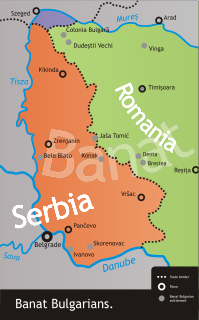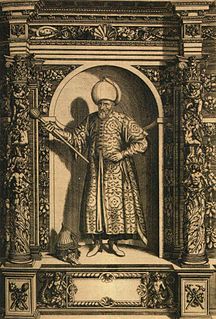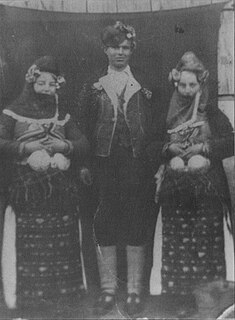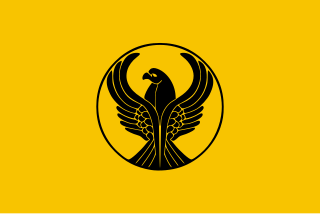 W
WAbkhazians of African descent or Afro-Abkhazians, also known as African Caucasians, were a small group of people of African descent in Abkhazia, who used to live mainly in the settlement Adzyubzha at the mouth of the Kodori River and the surrounding villages on the eastern coast of the Black Sea.
 W
WThe Banat Bulgarians, also known as Bulgarian Roman Catholics and Bulgarians Paulicians or simply as Paulicians, are a distinct Bulgarian minority group which since the Chiprovtsi Uprising in the late 17th century began to settle in the region of the Banat, which was then ruled by the Habsburgs and after World War I was divided between Romania, Serbia, and Hungary. Unlike most other Bulgarians, they are Roman Catholic by confession and stem from groups of Paulicians and Roman Catholics from modern northern and northwestern Bulgaria.
 W
WAma Gqunukhwebe is a subdivision of the Xhosa nation that was created under the reign of King Tshiwo (1670–1702) of amaXhosa who was a grandfather to Gcaleka and Rharhabe. It consisted mostly of the Khoi chiefdoms that had been displaced by colonists and became incorporated into the Xhosa nation.
 W
WKedahan Malay or commonly known as Orang Utara, is a sub-group of Malays that is native to Northern Malaysia and in southernmost parts of Thailand and Burma. They are among the earliest settlers in the Malay peninsula. Kedahan Malays comprised at least 15% of the total Malaysian Malay population.
 W
WThe Kists are a Chechen subethnos in Georgia. They primarily live in the Pankisi Gorge, in the eastern Georgian region of Kakheti, where there are approximately 9,000 Kist people. The modern Kists are not to be confused with the historical term Kists, an ethnonym of Georgian origin, which was used to refer to the Nakh people in the Middle Ages.
 W
WPenangite Indians, also known as Chulias, are Malaysian Indians that live primarily in the state of Penang, Malaysia. Most are the descendants from those who migrated from India during the British colonisation of Malaya. However, historical sources prove that the ancient Indians arrived in Penang during the Chola dynasty. Today, the Penangite Indians are one of the most successful ethnic groups in Penang state and whole of Malaysia. Penangite Indians forms a large percentage of the state's professional community such as business, law and medicine as well as politics, it can be proved by the appointment of Dr. P. Ramasamy as deputy chief minister of Penang. It made him the first Malaysian of Indian origin to hold the post of deputy chief minister in any state of Malaysia. In addition, first Tamil Vernacular School in Malaysia was established in Penang.
 W
WMuslim Slavs or Slavic Muslims are ethnic groups or sub-ethnic groups of Slavs who are followers of Islam. The term is most often used in the study of the Balkans, Southeastern Europe, Caucasus, Crimea, and Volga region. The majority of Slavic Muslims are found in Bosnia and Herzegovina, Albania, Kosovo, Montenegro, Bulgaria, and some Russian Republics; Slavic Muslims can also be found in southern Serbia and North Macedonia. Slavic Muslims number around 4.1 million in Europe itself, and around 9% of all Muslims in Europe are of Slavic origin.
 W
WPomaks are Bulgarian-speaking Muslims inhabiting Bulgaria, northeastern Greece and mainly northwestern Turkey. The c. 220,000 strong ethno-confessional minority in Bulgaria is known officially as Bulgarian Muslims. The term has also been used as a wider designation, including also the Slavic Muslim populations of North Macedonia and Albania.
 W
WThe Pontic Greeks are an ethnically Greek group who traditionally lived in the region of Pontus, on the shores of the Black Sea and in the Pontic Mountains of northeastern Anatolia. Many later migrated to other parts of Eastern Anatolia, to the former Russian province of Kars Oblast in the Transcaucasus, and to Georgia in various waves between the Ottoman conquest of the Empire of Trebizond in 1461 and the Russo-Turkish War of 1828-1829. Those from southern Russia, Ukraine, and Crimea are often referred to as "Northern Pontic [Greeks]", in contrast to those from "South Pontus", which strictly speaking is Pontus proper. Those from Georgia, northeastern Anatolia, and the former Russian Caucasus are in contemporary Greek academic circles often referred to as "Eastern Pontic [Greeks]" or as Caucasian Greeks, but also include the Turkic-speaking Urums.
 W
WThe Sadz or Asadzwa, also Jigets, are a subethnic group of the Abkhazians. They are sometimes purported to have originated from the Sanigoi tribe mentioned by the Classic authors. In the 6th century, they formed a tribal principality, which later commingled with the Abasgoi, Apsilae and Missimianoi into the Kingdom of Abkhazia.
 W
WUromi, meaning "they jumped or fled away", is a city located in north-eastern Esan, a sub-ethnic group of the Binis in Edo state, Nigeria. At various points in Uromi's history, the city and people have been an important part of the Benin Empire.